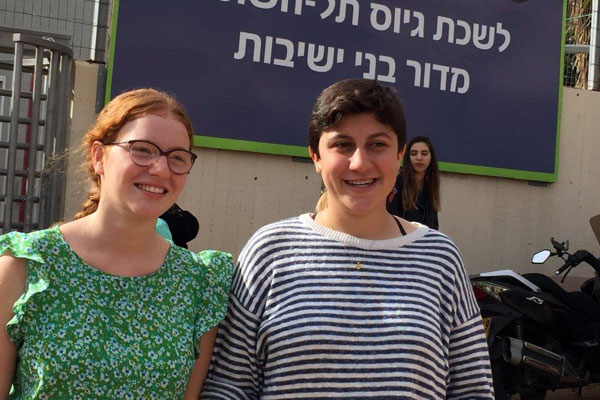Dozens accompany the two young women as they declare their refusal to serve in the occupation.

Two Israeli conscientious objectors declared their refusal to serve in the occupation Wednesday morning at the IDF’s Tel Hashomer induction base outside Tel Aviv. The two young women, Tamar Alon of Tel Aviv and Tamar Ze’evi of Jerusalem, are expected to be sentenced to military prison within a matter of hours, after which they will be sent back to the induction base where they can be sentenced to another stint in prison — a cycle which can continue for months.
[Update: A military tribunal sentenced Alon and Ze’evi to two days in prison each, after which they will be brought back for another hearing and possible sentencing.]
Around 80 supporters accompanied the two conscientious objectors to the military induction base, carrying supportive signs and calling out slogans demanding the pair’s release and the end of Israel’s military rule over the Palestinians. The solidarity protest was organized by the “Mesarvot” (the Hebrew word for “refusers,” in the female tense). Among the protesters was Member of Knesset Yousef Jabareen, who called the two refuseniks “a ray of light” in dark times, noting how symbolic it is that they declared their refusal on the same day the Knesset is expected to vote on a law that would retroactively legalize the theft of Palestinian land.
Also speaking at the solidarity protest was conscientious objector Tair Kaminer, who spent five months in military prison earlier this year for her refusal to serve in the occupation. Kaminer told the new objectors that as they enter prison a silence will fall upon them, but they should remember that their actions are actually breaking that silence and that they will draw support from all over the world.
The protest caught the attention of many other Israeli youngsters who were being drafted into the army on the same day, as well as their friends and families who gathered to see them off. Some of them cursed and spat at the refuseniks and their supporters, and accused them of treason. Police separated the two sides. One young man accompanying a friend as he was drafted, told the two refuseniks that they are ignoring the fact that “the IDF is the most moral army in the world.”
Tamar Alon and Tamar Ze’evi, who are asking to perform civilian national service instead of military service, see things differently. “From a young age I met my parents’ Palestinian friends — I met people who are supposed to be my enemies who smiled at me, played with me, and spoke with me,” wrote Tamar Alon in a declaration ahead of her refusal. “I can’t accept the claim that the oppression of another people, the denial of basic human rights, and racism and hate are necessary for the existence of State of Israel.”
Alon added that she finalized her decision to refuse serving in the army after hearing the speeches of two bereaved brothers, an Israeli and a Palestinian, at a joint memorial day ceremony in which they both asked others to learn from their personal tragedies and instead work for peace.
“On the one hand, it’s my legal and societal obligation, which I always intended and expected to fulfill — the right to safeguard the security of my home and the people most dear to me,” Tamar Ze’evi wrote in her declaration. “But on the other hand, is a childhood in the shadow of terror attacks and wars real security? What about the security of those human beings on the other side of the walls? Am I, as a daughter of the people controlling the another people, responsible for their well-being? Where is the line where we stop collaborating, have we already crossed it? I am not willing to lend a hand to a situation in which two peoples are living in fear of each other, and are paying such a heavy price for dozens of years. Out of love for this land and the human beings who live in it, I want to believe, and I do believe that there is a different path and that we can effect change.”
A version of this article first appeared in Hebrew on Local Call. The headline and text of this article have been updated to reflect that the two women have now been sentenced to military prison.

